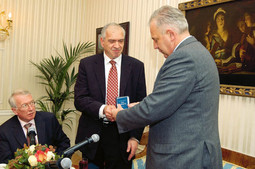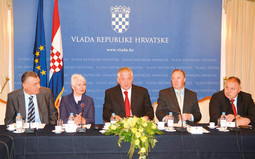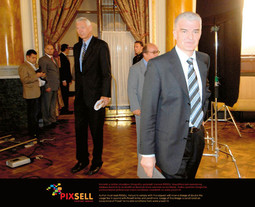Published in Nacional number 682, 2008-12-08
Government and the National Bank at odds
Perilous struggle for the survival of an inconsistent Prime Minister
In fear of social unrest the Prime Minister has changed his mind overnight and proposed a national budget nobody knows how to finance
 Governor Zeljko Rohatinski has warned Prime Minister Sanader that he is embarking on a dangerous gamble Presenting the proposed 2009 national budget last Friday, which foresees a deficit of 4.3 billion kuna or 1.6 percent of the gross domestic product, Prime Minister Ivo Sanader has exhibited all the inconsistency of his policies to date and also the weakest position he has ever presented as a negotiator. He has also shut Croatia's door to the international financial institutions whose help might save it from bankruptcy over the coming year in the crisis-ridden and unforeseeable conditions ruling the global economy.
Governor Zeljko Rohatinski has warned Prime Minister Sanader that he is embarking on a dangerous gamble Presenting the proposed 2009 national budget last Friday, which foresees a deficit of 4.3 billion kuna or 1.6 percent of the gross domestic product, Prime Minister Ivo Sanader has exhibited all the inconsistency of his policies to date and also the weakest position he has ever presented as a negotiator. He has also shut Croatia's door to the international financial institutions whose help might save it from bankruptcy over the coming year in the crisis-ridden and unforeseeable conditions ruling the global economy.
"Over the past 15 days or so the Prime Minister has show himself to be extremely inconsistent in two seemingly separate situations, and the chief reason for this is his fear of social unrest, defeat at the upcoming elections and, in the end, pressure to hold early elections," we were told by a member of the ruling party. As a result of the Facebook affair, he says, Sanader has caved in to the unions and abandoned the zero-deficit national budget and savings he called for the past three weeks.
After vehement criticism aimed at Sanader surfaced on the Facebook Internet site as a result of the announcements of savings measures, the Prime Minister nervously accused his critics, and the police detained several activists connected to a group that organised protests in Croatian cities. When the international press carried the story, commenting that Croatia was a repressive country, Sanader turned into the greatest defender of free speech, justifiable afraid that repression would only increase the level of dissatisfaction and lure more people to city squares, and the police made a public apology to those it had detained.
Panicking in the face of pressure from the Internet public, and the possibility that the spontaneous gathering on Facebook fuses with the dissatisfaction of union leaders, the Prime Minister has had an overnight change of heart in his position on a balanced national budget, caving in to unions and social demands, grown deaf to the advice of the economists he himself pooled in the Economic Council and announced a deficit. "Just a 1 percent deficit means a further 2.9 billion kuna of debt, and it is an open question where a loan could be acquired and under what conditions. It is absolutely appropriate that we go forward with no deficit and slash it to zero," Sanader said in mid November at an Opatija economic round table where he first announced that the state's expenditure would for the first time be equal to its earnings next year. "We have to change our behaviour, including on some very visible things like Christmas presents. I think we also have to slash expense accounts. I have proposed that we delay wage hikes for a year, and I am not referring only to civil services and beneficiaries of budget funds, but to all, from local authorities to the private sector," Sanader said at the time, adding that he would seek reduced expenditure.
Only three weeks later, under pressure from the growing defiance of the people, the Prime Minister changed his mind and proposed a deficit greater than last year's. "At this moment Government is going with a budget it feels can be financed, because we still do not know what the trends on the global and financial markets will be, especially in the EU countries," Sanader said on 5 December, after caving to unions in their demands that the deal to raise wages by 6 percent be honoured But that has not resolved the issue of peace between the opposed social groups. As a result of a deficit in the national treasury, that will amount to at least 4.3 billion kuna next year, Sanader has opened a front towards Croatian National Bank governor Zeljko Rohatinski, but also towards employers, who will have less money to finance their operations next year.
 Government's so-called Economic Council includes, besides eminent economists, the ministers of the economy and finance, transport expert Ivica Mudrinic and veterans' affairs minister Jadranka KosorThe analysts with whom we have spoken all agree that the Prime Minister's capriciousness, both in the Facebook affair and in the preparations of the defence from the economic crisis, point to one thing: Sanader's administration does not make its decisions on the basis of well-though-out strategies, but is driven rather by narrow political motives which could soon see the country into serious problems. As a result of the deficit in the state treasury and mature debt the state will have to take on 16 billion kuna in credit in the coming year. That is the optimistic variant, as one economic expert explained, because the deficit, if one takes into consideration prior guarantees to shipyards and the undefined expenditures of the healthcare system, could be twice as large by the end of next year and reach 8 billion kuna. That will not be one bit easy in the tightening conditions for financing on the global market. After having seen the proposed national budget CNB governor Zeljko Rohatinski told the Government it was embarking on a dangerous gamble in which it will not be able to count on the assistance of the central bank.
Government's so-called Economic Council includes, besides eminent economists, the ministers of the economy and finance, transport expert Ivica Mudrinic and veterans' affairs minister Jadranka KosorThe analysts with whom we have spoken all agree that the Prime Minister's capriciousness, both in the Facebook affair and in the preparations of the defence from the economic crisis, point to one thing: Sanader's administration does not make its decisions on the basis of well-though-out strategies, but is driven rather by narrow political motives which could soon see the country into serious problems. As a result of the deficit in the state treasury and mature debt the state will have to take on 16 billion kuna in credit in the coming year. That is the optimistic variant, as one economic expert explained, because the deficit, if one takes into consideration prior guarantees to shipyards and the undefined expenditures of the healthcare system, could be twice as large by the end of next year and reach 8 billion kuna. That will not be one bit easy in the tightening conditions for financing on the global market. After having seen the proposed national budget CNB governor Zeljko Rohatinski told the Government it was embarking on a dangerous gamble in which it will not be able to count on the assistance of the central bank.
Last Friday the governor said that "some tendencies in the way of thinking are not good. Someone has obviously wrongly understood that the Croatian National Bank will print as much money as the state needs, but that will not happen." Rohatinski explained that the CNB provided additional liquidity to the banks in December enabling the state to take on more domestic debt and that it was prepared for another measure to free up an additional 800 million euro to banks in the first quarter of next year for further credit to the state. And that that is all that the CNB can do. Financing the national deficit, Rohatinski told Croatian Government, now depends above all on foreign financial institutions.
What the CNB could do, then, and which would be extreme measures, Rohatinski will not do, at the cost of his won resignation. He will not print money because that would lead to inflation and the implosion of the monetary system. He will also not reach into the state's foreign currency reserves to finance current expenditure, because that would reduce the country's credit rating, which would make lending abroad even harder and more expensive. One economic analyst, however, who wished to remain anonymous, feels that printing money is inevitable. "Government will patch holes as the political circumstances allow it to.
That means that in the case of a threat of social unrest it will take money from on budget line and move it to social measures. As is usually the case, the finance ministry will short-change companies with government contracts by delaying payments. When suppliers are no longer able to collect for their services, there will be a lack of liquidity, which will reduce budget revenues. It that situation it will be impossible to finance both the deficit and the mature debt. Government can reach out for loans from the European Investment Bank or the European Bank for Reconstruction and Development, but that will not last for long. When Croatia finds itself in a situation in which it cannot go any further, the CNB will have to print kuna," says the analyst.
 Franjo Lukovic and Bozo Prka"From the measures taken so far, caused by the coming crisis, it is evident that the greatest concern for the Sanader administration is how to stay in power. This is a view shared by a foreign analyst, who feels that Sanader will try to use the crisis in the economy to increase the power and influence of the state and by so doing achieve his chief goal – that of avoiding early elections and remaining in government. "A deficit in the national budget is not in itself a catastrophe if that money is used for reforms that will make the economy more effective. A budget shortfall used for expenditure, however, can in this situation only make things worse. The Prime Minister has already indirectly accused the unions for the financial catastrophe that may ensue, as they did not accept a wage freeze for civil servants, even though less than a third of the deficit is accounted for by that budget line.
Franjo Lukovic and Bozo Prka"From the measures taken so far, caused by the coming crisis, it is evident that the greatest concern for the Sanader administration is how to stay in power. This is a view shared by a foreign analyst, who feels that Sanader will try to use the crisis in the economy to increase the power and influence of the state and by so doing achieve his chief goal – that of avoiding early elections and remaining in government. "A deficit in the national budget is not in itself a catastrophe if that money is used for reforms that will make the economy more effective. A budget shortfall used for expenditure, however, can in this situation only make things worse. The Prime Minister has already indirectly accused the unions for the financial catastrophe that may ensue, as they did not accept a wage freeze for civil servants, even though less than a third of the deficit is accounted for by that budget line.
It is clear to everyone, however, that wages are not the problem, and that a 6 percent raise, i.e. 1.5 billion kuna, will save the state from bankruptcy. In this way your Prime Minister is trying to divert public attention from his mistakes, i.e. the lack of implementation of reforms in the past period. Besides, when the crisis hits the real sector and companies find themselves in trouble, Government will be the one to decide whom it will help and with how much money. That will increase the power of the state, i.e. the person at its helm." According to the worst case scenario, forecast by some economists, and which all agree is currently realistic, if the global crisis persists, Croatia will not be able to service its debts, and a debt crisis, in which we have been for some time, will turn into a bankruptcy. As a result of the massive financial needs of the state, the majority of the money the Croatian National Bank will free up to commercial banks will be picked up by Government to refinance its obligations. In that kind of situation companies will be left with very little available capital, and some of them will go under, while some will cut costs by laying off workers. According to the estimates of the Croatian Employers' Association, the first wave of the crisis will do away with 50,000 jobs. Since there will be a rise in the demand for loans in the conditions of reduced bank liquidity, there is a danger that banks could raise interest rates, and some people and companies will no longer be able to service their loans.
 Damir KustrakIn that situation distraints will be carried out on mortgaged property, for the most part real estate and vehicles. Demand will drop, however, and banks will not be able to sell seized property to cover their placements. If banks get into serious trouble the state will have to bail them out and a part of the banking system, just like in the late 1990s, will again pass into state hands, and with them many companies. According to these forecasts the Croatian Privatisation Fund's currently empty portfolio could in two year's time again be chock full of companies ready for sale.
Damir KustrakIn that situation distraints will be carried out on mortgaged property, for the most part real estate and vehicles. Demand will drop, however, and banks will not be able to sell seized property to cover their placements. If banks get into serious trouble the state will have to bail them out and a part of the banking system, just like in the late 1990s, will again pass into state hands, and with them many companies. According to these forecasts the Croatian Privatisation Fund's currently empty portfolio could in two year's time again be chock full of companies ready for sale.
In the entire situation, some analysts point out, it is good that Croatia can still avoid that kind of catastrophe. Sanader has two options available to prevent the pessimist's forecasts from being realised. The first is to form a technical Government of experts, scrap the deal with the social partners insofar as wage hikes are concerned and slash all expenditure on investments that will not bring a return on investment on the short term, and redirect that money to financing the reform of the state administration and a series of measures to revive the economy. The other option boils down to a hope that the financial sector in Europe will recover over a short period of time and once again, under the old conditions, invest in countries like Croatia.
Employers without credit Reacting to a proposed national budget that foresees a deficit in excess of 4 billion kuna, Croatian National Bank governor Zeljko Rohatinski has told Government that the central bank will no longer be able to influence the liquidity of domestic banks. The final measure on which Government can count is a reduction of the level of minimum foreign currency claims in the first quarter of 2009. That would free up 800 million euro for banks for the further crediting of the national budget so that foreign obligations could be serviced. That means that almost all of the available money will go to the state, and it is an open question how companies will manage. In any event, some companies will go belly up and some will have to cut operating costs by laying off workers. After admitting that there was a crisis Sanader set up an Economic Council, an advisory group of experts, dubbed by the press the "council of the wise", that should help Government in adopting crisis measures. But, along with eminent economists, the group also includes union representatives, employers, and even veterans' affairs minister Jadranka Kosor, so that the council can hardly be referred to as "economic". Almost all of the economists in the Council are disappointed with the proposed budget with its 4.3 billion kuna deficit. Only Ljubo Jurcic is not opposed to the deficit a priori. He too, however, feels that the structure of the proposed budget is poor because the problem is not in the deficit but rather on what it is spent on. And in the proposed 2009 budget the state will take on debt to finance expenditure, not development.
Related articles
Sanader’s eight fear SDP — Won’t bring down Government
Despite forecasts that he would, former Croatian Prime Minister Ivo Sanader, who recently took his seat in Parliament, will not work from the house… Više
Latest news
-
28.10.2010. / 14:15
'A profitable INA is in everyone's interest'
-
28.10.2010. / 09:38
Sanader’s eight fear SDP — Won’t bring down Government
-
21.10.2010. / 15:02
Interior Ministry turned a blind eye on Pukanic assassination
-
20.10.2010. / 09:34
Barisic could bankrupt HDZ




